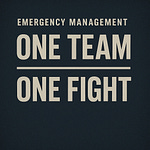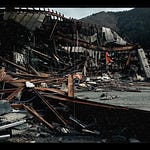Do You know You Are In The Water?
I have only recently learned of a great thinker named David Foster Wallace. He was a writer and college professor and challenged the way people look at life. Although he left this world way too young, David made a lasting mark with his writings and thoughts. When I think of the people I have come in contact with, both good and bad, I try to learn from them.

David Forter Wallace, when he was addressing the students at Kenyon College, he started his speech with this story: There are these two young fish swimming along, and they happen to meet an older fish swimming the other way, who nods at them and says, "Morning, boys. How's the water?" And the two young fish swim on for a bit, and then eventually, one of them looks over at the other and goes, "What the hell is water?"
One of my students asked me how someone in emergency management can positively impact their community. The answer was simple, don’t forget the people you serve. However, we should explore this question and my response a little deeper. In the spirit of David Foster Wallace, the simple answer may be the most complex.
We must break down this student's question first as a humanitarian and then as a professional. And for my friends that do not think you are a humanitarian, you are in the wrong line of work. We have chosen a field where we deal with disasters that impact people's lives. We have to remember that we are serving people, not the damage that has occurred or the threat we face. I have repeatedly seen how we meet the challenges of the danger, the hurricane, the storm, the fire, the earthquake, but we forget about how these disasters affect the displaced people. We talk about numbers, the billions of dollars the response costs, the number of acres burned, the thousands of emergency responders on scene, and the total number of people evacuated.
We don't talk about the number of people returning to a home that was underwater or burned to the ground. Their struggles to rebuild their home that will never be the same for them. We ignore their losses that will never be replaced, the loss of photos hanging on the wall, the baby clothes in a cedar chest in the attic that are gone forever, and the blanket that kept them warm when sitting on their favorite chair.
We forget about the loss of the residents from the community that cannot or will not return. They may be a statistic in some accounting program at city hall, but they are real people to neighbors and friends that are now lost. When we talk about recovery, it is all numbers and not reflective of what the community is or was.
We do not realize that we are in the water.
The fish story's point is that the most obvious, important realities are often the hardest to see and talk about...In the day-to-day trenches of emergency management, the banal platitudes of "we have been there and done that" and “You did a great job on this drill, everyone.” You know, the ones that make us all feel good even when we see areas of improvement. They can have a life or death importance.
Before I Got Old, I Had All of The Answers
When I was young and had all of life's answers, I complained about running a routine call and how the victim's family was in a panic. A senior department member looked at me and told me that this might be the 1,000th time you have seen this issue. However, it was their first time for them. What I learned that day is that we need to put ourselves in their shoes, empathy is the most critical skill that we can learn and develop, especially when we have become hardened to the horrors of the job.
We need to celebrate the victories, the lives saved from near death, the family reunified with their pet, the everyday hero who was at the right place and did the right thing. We need to bring the community together after the disaster and lead them through recovery. We need to share tears and smiles with the people that look to us for answers. And together, we can become a stronger community.
When we seek the truth of what we do, it has nothing to do with the number of years on the job, the training, the classes we attend, and the meetings we hold. Everything that we do as emergency managers are simple. It is awareness, awareness of what is fundamental and essential, awareness that we are serving the people of our jurisdiction, the members of our organization, and the individuals in need. We need to keep the core of what we do in mind, life safety, preserving property, and protecting the environment. As David Foster Wallace said, we have to keep reminding ourselves over and over:
This is water.
This is water.
Podcasts
The Todd DeVoe Show
Emergency Management as a Second Career
Emergency Management is a highly diverse career field with a favorably projected future job growth. There is no clearly defined pathway for becoming an emergency manager and why are people moving to emergency management? Because there are opportunities in public service at all levels of government and a variety of sectors, including education, healthcare, and private business. Today, we explore emergency management as a second career with Jill Caputi and Cassie Nanoff.
prepare. respond. recover
IBHS, Destroying Buildings to Save Yours
Today prepare.respond.recover. speaks with Lead Research Meteorologist and Senior Director for Standards and Analytics Dr. Ian Giammanco from the Insurance Institute for Business & Home Safety (IBHS). He talks about the crazy experiments IBHS conducts to save lives and property as a result of severe weather. Why does IBHS do what they do? As we unfortunately know, severe weather disrupts lives, displaces families, and drives financial loss. However, IBHS’s building safety research helps lead us to real-world solutions for home and business owners, helping to create more resilient communities.
If you would like to learn more about the Natural Disaster & Emergency Management (NDEM) Expo, please visit us on the web – https://www.ndemevent.com
Business Continuity Today
Communications and Active Shooter Response Planning
The news of two active shooter events one in Buffalo NY and the other at a church in Laguna Woods CA, and mass notification communications mistake by a major city in SoCal are driving the conversation in emergency management. Do you have a plan on how to communicate with your team, your clients, and stakeholders? Now is the time to take a look at your plan, test it and revise it if you need to. Join BCT as we explore these events and more.
What To Read
New York City resident tested positive for Monkeypox
According to A.P., New York state health officials said late Friday that a New York City resident tested positive for the virus that causes monkeypox.
Why it matters: It's the state's first confirmed case of monkeypox since multiple countries recently reported infections from the virus, which previously had been rarely seen outside of western and central African countries.
It's also the U.S.' second confirmed monkeypox infection this year, as Massachusetts reported the first on Wednesday.
Your Emergency Management Team Has a Strategy Whether You Like It or Not
By Kelly McKinney
As an emergency manager, you’ve got a huge job to do...but you don't have nearly enough resources to do it with
You pry away the valuable time of executives, managers, and staff all across your organization
...building resilience for the inevitable next disaster
...while struggling against the fierce headwinds of competing priorities, high expectations, and ever-increasing risk
All the while, that little voice in your head tells you that all of this is somehow your fault
...not only because you chose to pursue a career in emergency management (instead of going to law school as your mother told you)
Crisis Response Journal
Examining post-incident processes
There is general learning here for organizations; learning about the strengths and weaknesses of internal processes. The evidence provides an insight into how organizations deal with priority setting and governance. It gives a hint about corporate perceptions of risk and it shows that it has become routine for important functions to become under-resourced, leaving individuals struggling to provide services to the standard that they regard as the minimum.
Bringing clarity to your Business Continuity exercise
In planning an exercise, we tend to confuse what it is we’re trying to achieve. Even though we think we know what we want our people to do or to experience, we seem to have a habit of making it far less clear than we should. So, aprons on and let’s see how setting the right intentions for a BC exercise is as simple as following the recipe for your favorite cake.














Share this post